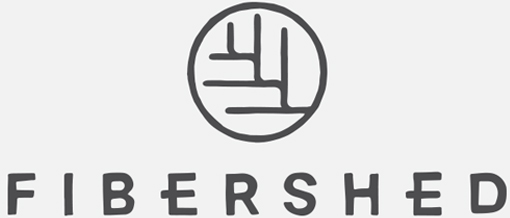Written by Sasha Wirth and photographed by Paige Green Photography
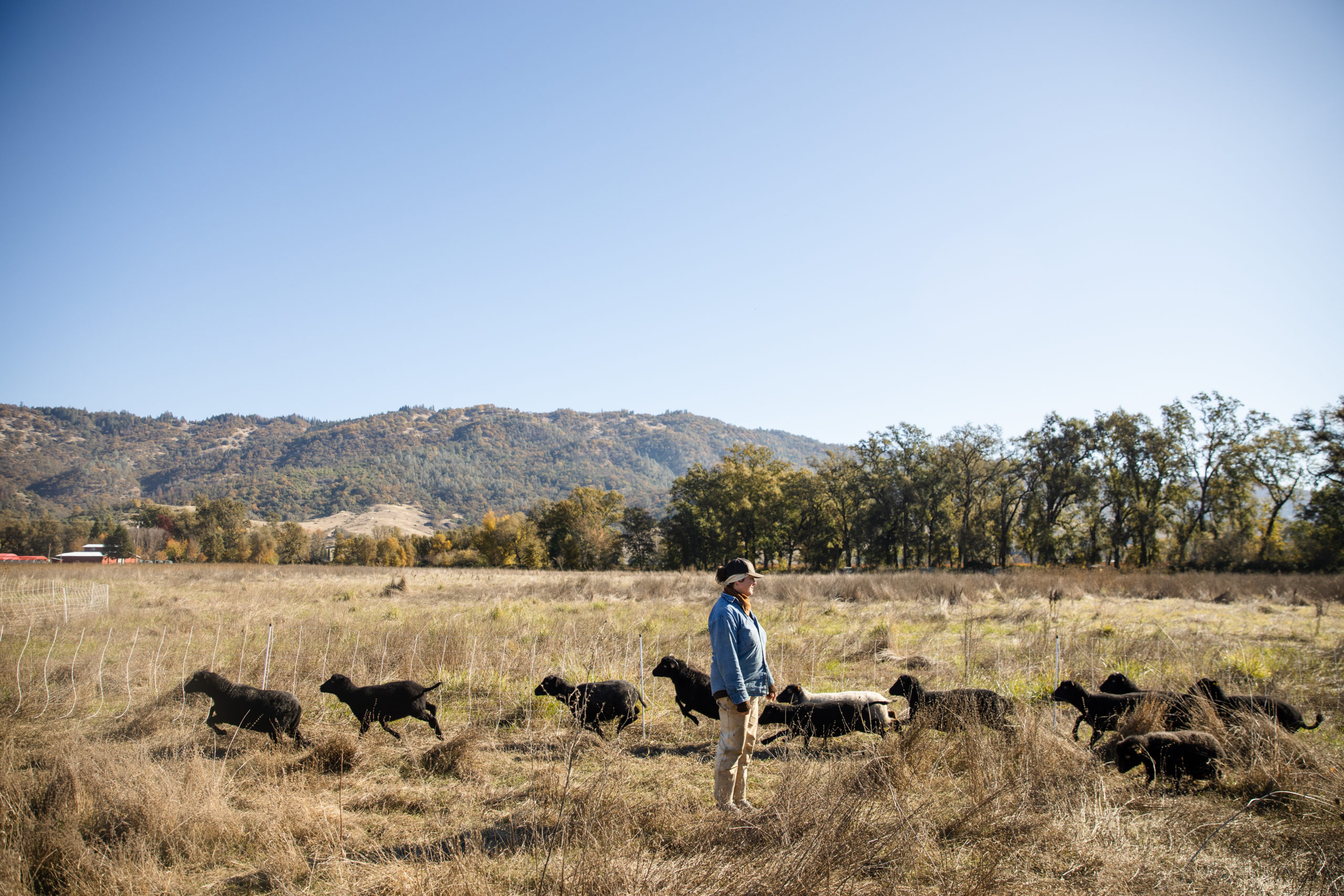
“Step by step, it’s coming together,” says Marie Hoff, gazing out over the pasture where her flock of Ouessant sheep graze alongside pecking hens. A plucky rooster keeps a beady eye trained on her as she begins to walk the perimeter of her property – a 2.5 acre homestead in inland Mendocino County – pointing out all the climate beneficial practices she and her husband have been steadily putting into place.
From the introduction of chickens this past summer to revitalizing an old water tank, Marie is determined that each decision be carefully considered and aimed towards supporting healthy land management. This mindset epitomizes both her personal values and the way she runs her business, Full Circle Wool – a wool goods and grazing company.
“Look at this!” she grins, bending down to delicately touch a sprouting brassica plant. It’s the first hopeful sign that the extensive cover crop she planted is taking root. “The soil was incredibly compacted when we bought the property five years ago,” Marie explains, “struggling with stunted grass and invasive annual varieties. But we are trying to help it heal from over-enthusiastic mowing, and it’s exciting to see how quickly the land is responding.”
Two grants have been instrumental in helping Marie make significant strides in improving her land. Selected for a Carbon Farm Seed Fund grant through Fibershed, she used the funds to jumpstart the revival of her land with a rainwater catchment system. With this setup, Marie will be able to use the rainwater for growing cover crops and perennial plants, which create better nutrient cycling for the land with their deep roots. In addition, a Healthy Soils Program grant through CDFA (California Department of Food and Agriculture) enabled Marie to apply compost to begin the process of fortifying and restoring her soil.
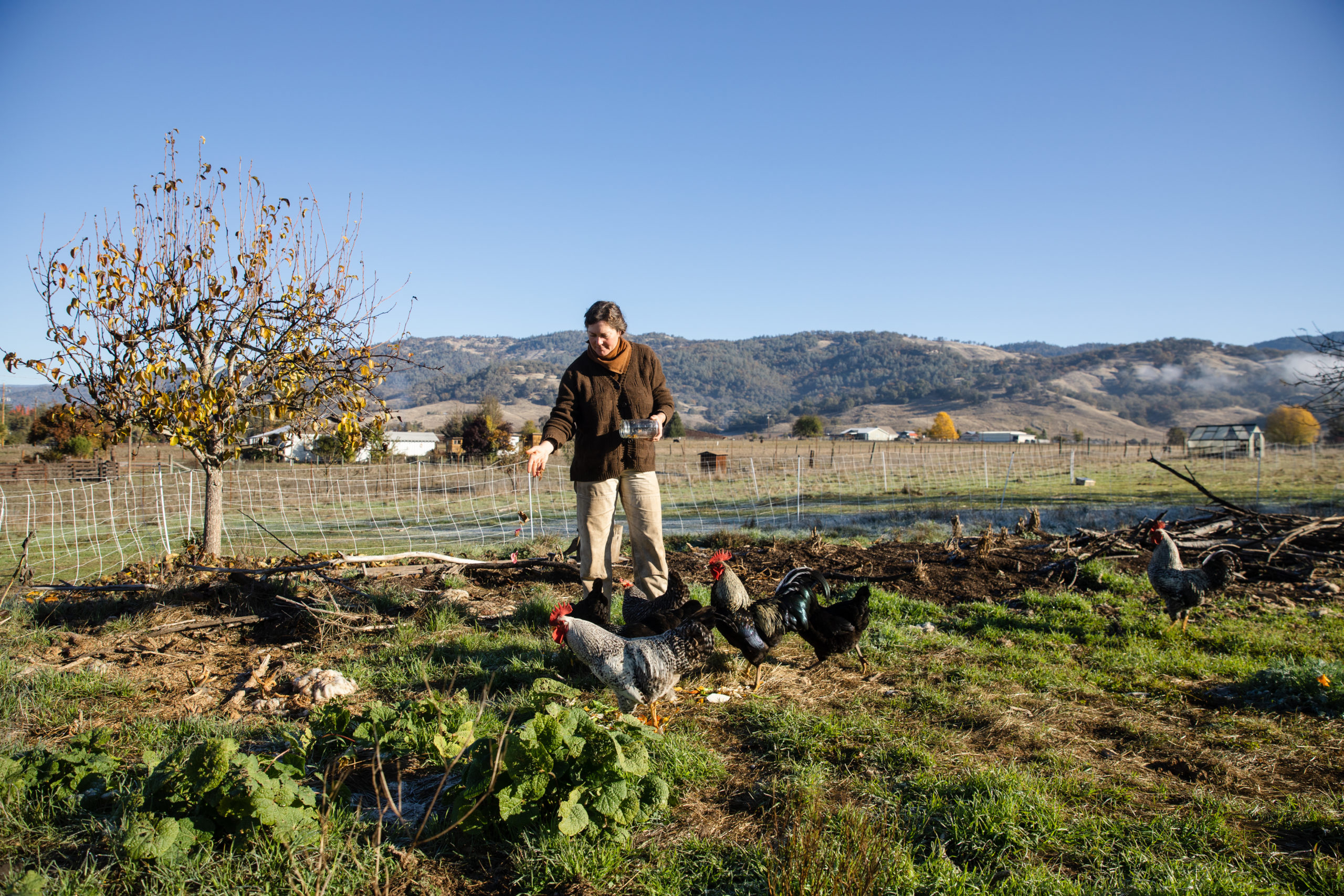
Throughout the process of applying for the grants and studying land management, she learned about the vital role of diverse microbes in the soil, which prompted her to add chickens (their manure helps counteract parasite overload on the land that could come from just having sheep). She’s also started planning for hedgerows and a silvopasture. “Having a lightly wooded grassland with fruit and nut trees will be good for additional nutrient cycling and water flow, and offer shade and treats for the animals,” she adds eagerly.
A curious sheep trots over to investigate what Marie has found on the ground. She is a dark and quick animal, part of the rare heritage Ouessant breed that lays claim to being the smallest sheep in the world. In addition to being known for their size, Ouessant sheep are also valued for their deep jet-black wool, and for being healthy, hardy and non-picky browsers. These qualities make them wonderful compact grazers – a quality that first caught Marie’s attention long before she purchased her property, spurring her to buy her first seven sheep in 2013.
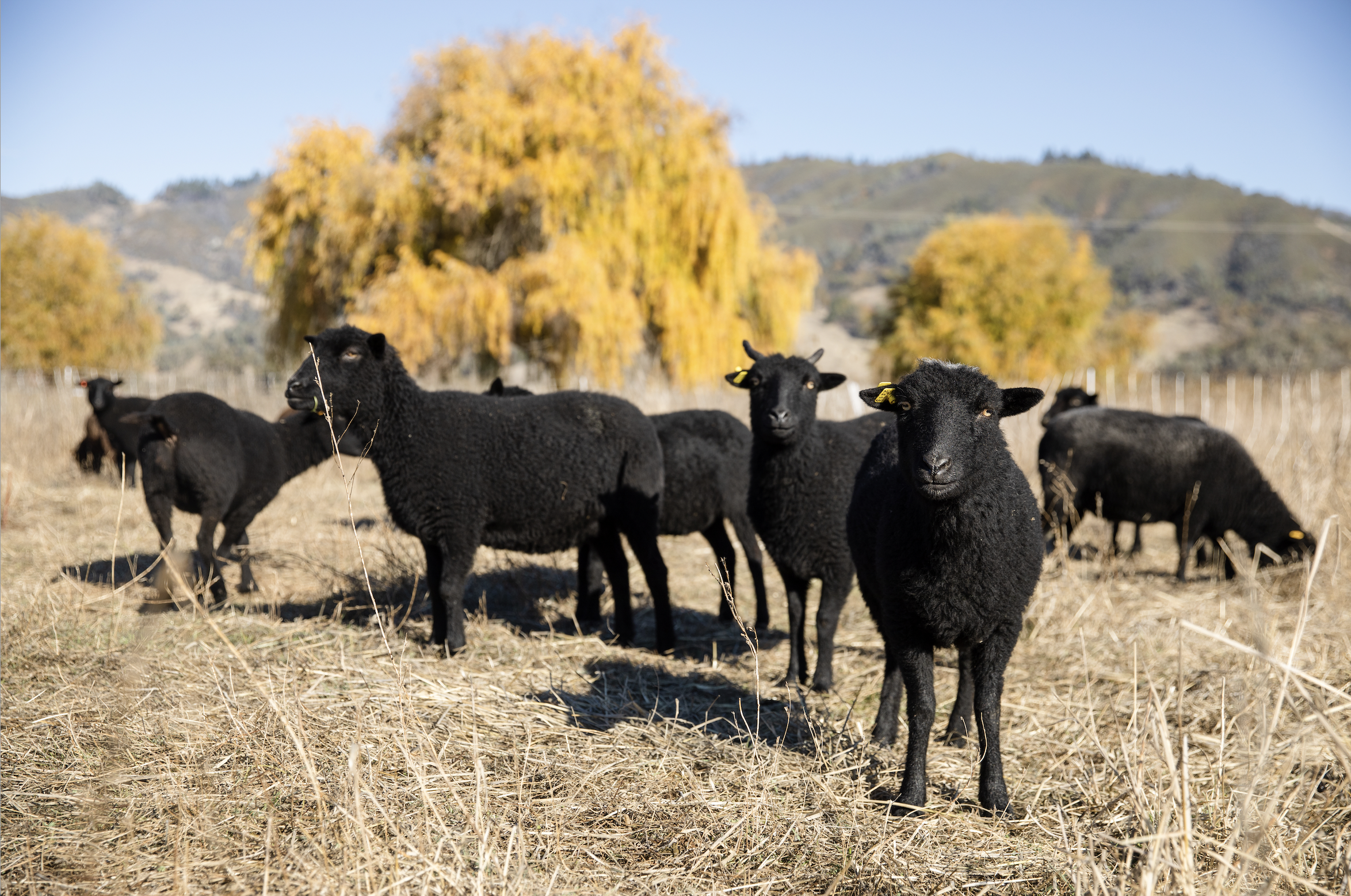
“They were offered to me to purchase, but I didn’t have my land at the time. However, I did find a temporary place to put them and decided just to forge ahead!” she laughs. “It was a bit of a wild move and a long shot! Of course, I learned as I went, though I don’t recommend doing it that way.”
With a passion for sheep steadily building over time, Marie immediately saw the business potential – contract grazing, to be exact – and seized the opportunity to partner with Leslie Adkins (a friend, fiber artist and farmer) to obtain those first sheep. Together they invested in and brought out a small flock from the East Coast, and a friend offered to let Marie’s sheep live on their land (while Leslie’s went to live at her then eco-farm in Santa Rosa, and have since moved to Illinois). In late 2013, Capella Grazing Project, named after the shepherd’s star, was in business.
Offering weed control, land clearing, fire prevention and fertilization services to areas like vineyards and other private properties, the business began to establish itself. Through breeding efforts, the flock began to grow and is now the largest flock of Ouessant cross sheep in the West. But this was only the beginning for Marie.
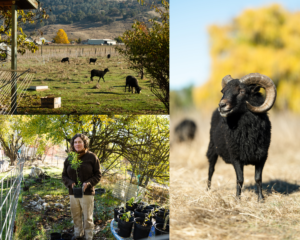
Growing up, she’d never envisioned herself as a shepherd. With a degree in Dance and Performance Studies, Marie assumed she’d spend her days leaping and turning in a studio or onstage, rather than tromping through pastureland with wooly companions. But the recession hit soon after she graduated in 2005, and work in the arts became difficult to come by.
“It was sobering. I looked at my degree and thought ‘What am I going to do with this?’” she recalls. To make ends meet, she took on a series of odd jobs – catering, local community performance work, and vending at the farmers’ market.
“I was living a young person’s bohemian lifestyle in the Bay Area, which was fun, but it could only go on for so long,” she says. “Years passed and it was 2012, and I was still asking myself ‘What am I doing?’ Something needed to change.”
The first shift came in reframing the question she’d been asking herself, which turned her life in an entirely new direction. “It was my lightbulb moment. I began reflecting on ‘What would I do if I could do anything?’ And the answer was fast and clear. I wanted to work outside on a farm.”
Working at the farmers’ market had brought her tremendous enjoyment, and through her contacts she found opportunities to visit farms and homesteads. “I began to learn so much and was exposed to different types of agriculture. But being around sheep and herding them particularly drew me in. There was something special about moving and exploring the land with them. It was my rabbit hole opening,” she smiles, her blue eyes shining, “and I’ve been going down it ever since.”
It would only be a matter of time before Marie went from visiting farms to desiring a place of her own. But first would come Capella Grazing Project, which gave her an appreciation for, as well as a stark understanding of, how connected the health of her animals was to the land they grazed.
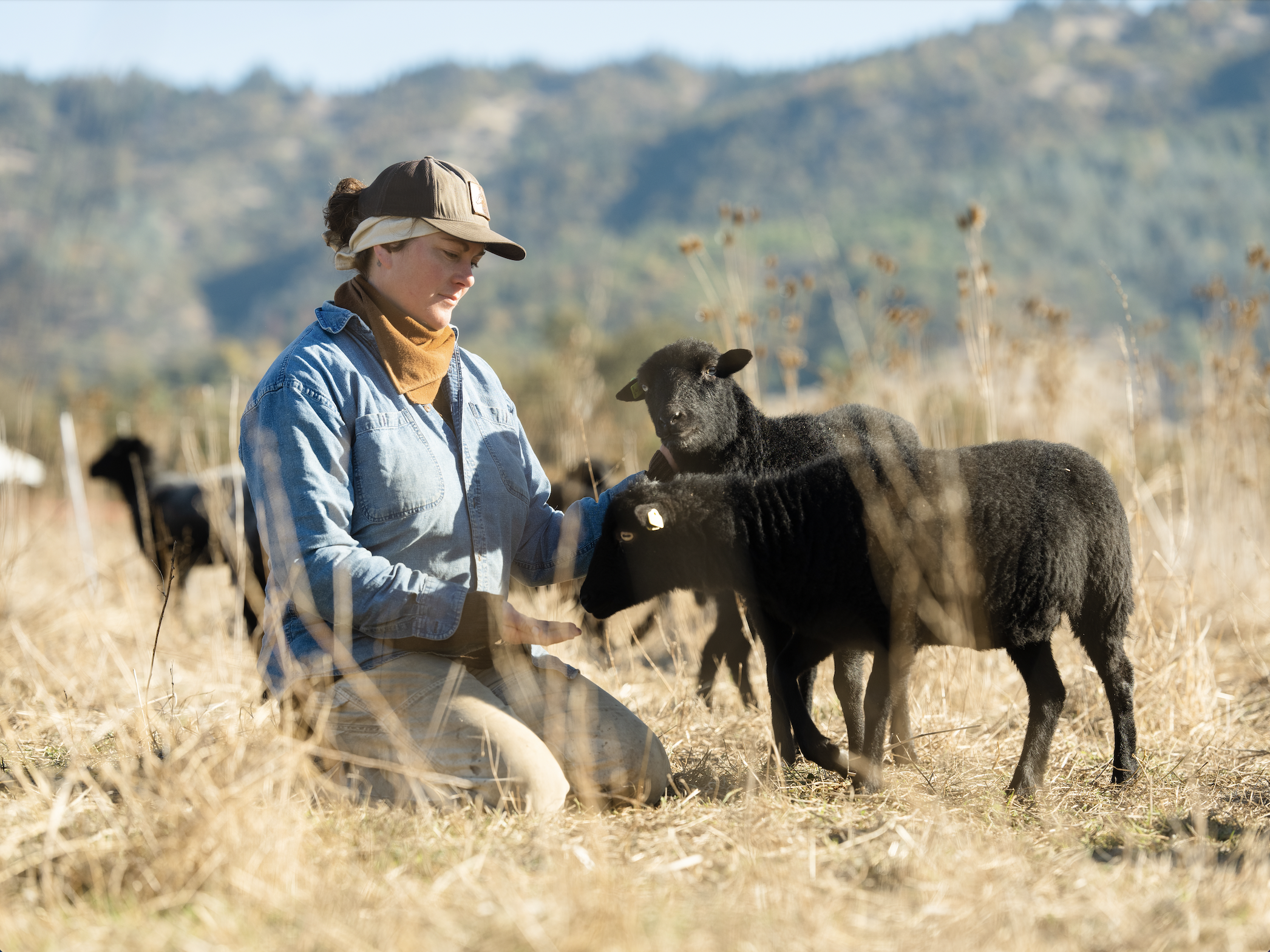
“To protect my flock I put certain parameters in place, such as not allowing any synthetic pesticides or copper sprays to be used where they are grazing. Other contract grazing operations do this as well. And for biosecurity, no other livestock can have been on the land for two years prior, which I don’t think is as common. This reduces the risk of contagious disease contact, and keeps the sheep safe and clean and healthy. In return, the animals put vital nutrients back into the land, contributing to a thriving ecosystem.”
Working for a few years as Fibershed’s Producer Program Coordinator also introduced Marie to many local farmers and ranchers, who both shared her passion for sheep and a desire to incorporate climate beneficial practices on their land. But through conversations and burgeoning friendships, she began to notice a disconcerting problem: there was no supply chain or demand for the vast amount of coarse wool that was being produced in Northern California, forcing the farmers to either dispose of it or sell it at a loss or break-even price. With a sense of urgency, a new question surfaced for Marie – What can be done with all this wool?
“I had to build a supply chain sometimes where there wasn’t one,” she says, walking back towards her farmhouse and home studio. “I knew that environment dictates what kind of sheep can thrive in a place, which determines the kind of wool available. Cold and wet climates support sheep with coarser wool, while more popular breeds like merino thrive in low-moisture desert climates. No one was seeing the value of our coarse local wool, and that had to change.”
To experiment with what could be done with the fiber, Marie purchased the wool clip (a farm’s entire seasonal supply of wool) from Loren Poncia of Stemple Creek Ranch and Jim Jensen of Jensen Ranch. After a bit of trial and error, she realized it made wonderful wool batting and connected Loren and Jim with Coyuchi, an organic home textiles company based in nearby Point Reyes. They began to use the wool in a line of duvet covers and mattress toppers, and the company has since become a vocal proponent of sourcing from farms who aim to mitigate climate change.
Through Loren, Marie was put in touch with Jill Hackett of Ferndale Farms in Humboldt County. She purchased Ferndale’s coarse white wool, and from her determined and creative mind she developed the fiber into a line of popular home goods. Full Circle Wool opened in 2016 as a complementary business to Capella Grazing Project, selling batting, felt, and what would become the company’s best-selling product: all-purpose wool sponges. It has since expanded to include other home goods such as pot holders and trivets (aka hot pads), a limited fashion line, and an exclusive collaboration with Darci Rose offering a selection of woven pillows and throw blankets.

Bonnie Reardon, a local seamstress and knitter, is employed for the company’s sewing and knitting needs, and all the cutting is done in San Francisco. The products are simple, honest and durable – both pleasing to use and good for the environment. Which is no surprise, as Marie wouldn’t have it any other way.
“It was a conscious decision from the beginning that Full Circle Wool would create a two-fold return,” she says, reaching the house and settling down on the porch. “First, it would support local farmers and their land by buying their wool at a rate that was profitable to them. Then, it would give back a percentage of sales towards implementing new climate beneficial practices. We’d be supporting the land management of today while simultaneously investing in tomorrow.”
And she’s shown that something as humble as a sponge can embody this large vision. Demand for them continues to grow as customers happily tout the many ways they can be used – to wash dishes, scrub a face, or clean surfaces. They’re compostable, long-lasting and naturally inhibit mold, bacteria and odor. But most importantly, they’re a starting point for many people to lean into a more sustainable lifestyle. A poignant example of how the smallest of things can illuminate the interconnectedness between people, animals and the environment. How something so basic can be a catalyst for change.

“This work, it’s relational,” she says. “An intimate connection between the land and animals, the farmers and the greater community.”
Marie grows quiet for a moment.
“When I lived in an urban setting, I felt so isolated, even though I was surrounded by people,” she begins slowly. “But this way of life – it brings comfort. Even though I don’t see very many people, I have deeper relationships with animals and plants. It’s a web of things.” She stretches out an arm towards her pasture, where the sheep are meandering, the chickens scratch happily, and vibrant green shoots peek out of the earth.
“I’m a part of this. The dance of life.”
Because while Marie’s talent for choreography may not currently be seen up on a stage, it is undoubtedly here. Playing out in the sequence of steps she is taking to care for her flock, support her community, grow a business and heal the land. A dream and purpose, it can be said, coming full circle.
